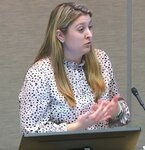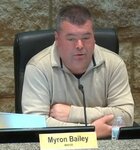



At the March 20 regular meeting, the Cottage Grove City Council took heated comments from residents of the Prestige Estates neighborhood (west of Keats Avenue and north of 80th Street South) over a comprehensive road replacement project planned there for this summer and fall. At issue is a special assessment of approximately $6,700 to each property owner due to an expected “special benefit” to their property value as a result of the pending road work.
Residents speaking at the meeting’s public forum argued that regular road/curb/sewer maintenance ought to be solely a city cost as a public space, not treated as an individual benefit to their home values that should be borne by them via special assessment. While councilmembers acknowledged reasons why the residents may want to reject the project, the council ultimately approved the resolution with a unanimous aye vote.
Mayor Myron Bailey opened public forum comments by noting that at the Feb. 7 council meeting, there were concerns brought by residents in the public hearing about the project and its estimated costs to the affected homeowners. He also clarified that the current meeting was being held only for approval or rejection of the 2024 Pavement Management project, and that special assessment details can be debated after the work is done, when the exact costs will be known. The majority of residents who spoke at the meeting recommended rejection of the project at this stage.
“This is not the time to object to the assessment,” said Bailey. “This is the time to object to the project. If you want the council to vote no on the project, you may voice your position accordingly. If the council votes no, then your road will not be improved, and will continue to deteriorate. At this point, the assessment amount you’ve received for your property is preliminary in nature, but the statutory process requires the city to provide you with this estimate at this time. There will be another public hearing a few months from now when the council will consider the actual assessment amounts. You will be given notice of that hearing and you will have the opportunity to object at that time, in person or in writing. At this hearing, the only item under consideration by the council is whether or not they should order the project.”
Amanda Meyer, Cottage Grove City engineer, gave a brief re-introduction of the planned project, saying the full details were presented on Feb. 7, which include complete road and curb replacement, sewer, street light, and wiring upgrades. The last work on the roads in the Prestige Estates neighborhood was done in the mid-1990s, when it was built.
Councilmember Justin Olsen outlined the Pavement Management policies that Cottage Grove adopted decades ago, and said the special assessments account for less than half of costs, at approximately 45%. The other 55% of such annual neighborhood projects is traditionally paid for by the city and its taxpayers. “There are definitely variables to the way in which assessments are managed, community by community,” he said.
Meyer responded, “Quite a few years ago, staff put together our infrastructure maintenance task force and came up with our special benefit assessment policy. It has been revised a couple of times in the last couple of years, but ultimately that document is what’s guiding us for what Cottage Grove is assessing for, and how those assessments are done.” She continued, “Based on our policy, it is 45% of the total project cost assessed against those benefitting properties. And there’s discussion in that policy regarding what’s assessable work.”
Councilmember Tony Khambata asked for clarification on the main reason for the project as it is planned; he wanted to know if the “road bed is still structurally sound, but the top layer is starting to deteriorate,” which Meyer confirmed.
Public forum was opened for comments, and neighborhood resident Eli Weinmann was the first to speak. He said the project should be rejected by the council. He stated the Minnesota state constitution provides for justifiable assessments if there is a demonstrable special benefit to the homeowners, but only in that case. He argued that the estimated $6,700 assessment would not be realized by homeowners if, for example, they intended to hold onto their home for 20 years. Instead, he suggested it would be a net loss or a wash in that event as the roads would degrade again in that time period, not specifically benefitting the properties over time.
“That $6,700 special benefit that was pitched in 2024 is now worth nothing in 2044,” said Weinmann. “We pay for the city’s roads based on the failed pretense of a special benefit that, if it does exist upfront, will quickly fade away. There is no special benefit.”
Weinmann continued, “This is a maintenance project. I know it’s a maintenance project because it states so in the city’s own special assessment policy for public improvement, Section 3, Subsection 1.3. It’s called full pavement replacement major maintenance. It’s a maintenance project. It is designed for nothing but replacement to its original state when the neighborhood was built.”
He then said he doesn’t know of one of his neighbors that wants the project to continue as planned, and that’s it’s extremely unpopular.
“I protest the project itself,” he concluded. “It cannot legally move forward as a special assessment, and it should be rejected tonight.”
Resident Jake Robinson echoed Weinmann’s remarks, saying, “We’re replacing the existing road with the same road. There is no special benefit to the property owners. If anything, if you’re going to call it an asset, it’s a depreciating asset, as he said. It’s going to be worth nothing 20years from now when it depreciates back down to where it is.”
He pointed out that if the deteriorating condition of the road was contributing directly to property values over the years that their values would already have gone down each year, and that he and his neighbors are “not interested in paying for the maintenance of a public road.”
Resident Diann Schneider said, “I don’t believe the city is meeting its definition of a special benefit, and I think the burden is on the city to prove that we are in fact getting a special benefit by re-paving our road.”
Other residents highlighted the burden placed on homeowners with the estimated assessments, but not necessarily objecting to the project itself, even though they didn’t specifically ask for the planned road improvement.
City Attorney Kori Land weighed in to residents’ comments, reiterating that now is not the time to object to the assessments, as they won’t be finalized until the fall when the work is completed, but that now is the time to object to the project itself in front of the council before their decision. She suggested that residents could challenge the final assessment numbers later in district court, by submitting it in writing before the pending assessment hearing, where, after the appeal is perfect, “the experts argue it out in court.”
She noted, “The city does have to prove that the special benefit, or what your assessment is being charged, does not exceed what our appraiser says the special benefit value is.”
Land continued, “If there are enough no’s in the audience that you don’t want the council to order your project, then they won’t. And if that’s their decision that they want this street to go into a continuous state of disrepair, that’s the outcome.”
City Administrator Jennifer Levitt pointed out that the city has traditionally been very conservative with estimates like this, and in many cases comes in at a lower final cost than estimated after the bidding process is completed.
“Council, once you order the project, then we’ll move to an actual competitive bid,” she said. “If it’s an outlier, and outside of our engineer’s estimate, you have the ability then to reject all bids and re-bid the project to ensure that we’re in that margin that you feel comfortable with, and how that affects the residents’ assessment.”
Councilmembers Dave Thiede and Khambata both expressed deference to the homeowners and willingness to alter the project if necessary, including schedule. After more council discussion, Olsen made a motion to pass the resolution to forward the project. It was seconded by Thiede. Upon vote, the resolution passed 4-0, with Councilmember Monique Garza absent.